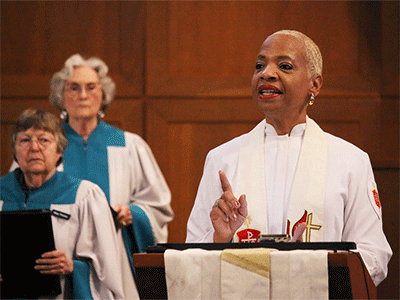The United Methodist Council of Bishops has elected East Ohio Conference Bishop Tracy S. Malone as its next president.
Your support of the Episcopal Fund apportionment helps pay the salaries and benefits of United Methodist Bishops and allows them to travel across their episcopal areas providing mentorship and leadership.
Malone, who will take the president’s gavel next spring, will be the first Black woman to lead the more than 110 active and retired United Methodist bishops in Africa, Asia, Europe and the United States.
Her election comes as she celebrates the 30th anniversary of her ordination.
The council’s active bishops elected Malone and their other officers by ballot Nov. 10 during the fall meeting at Lake Junaluska Conference and Retreat Center. The denomination’s episcopal leaders used the Nov. 6-11 gathering to focus not only on choosing new leaders but also seeking God’s guidance for how The United Methodist Church might move forward after a tumultuous time.
Also at their November meeting, the bishops also sought to answer the question: “How do we come together as a church around a common vision that takes us where God is leading?”

Zimbabwe’s Bishop Eben K. Nhiwatiwa suggested that the bishops be guided by the fact that Jesus is the same yesterday, today and tomorrow.
“So the vision of the church really is not like other visions where people only think of tomorrow. You think of what worked best when John Wesley started this movement, what is working best in the present and what is likely to work best in the future.”
Florida Conference Bishop Tom Berlin said that the bishops cannot overestimate the amount of trauma United Methodist churches around the globe have experienced in recent years resulting from the pandemic, global issues and the denomination’s internal strife.
“I believe we have to call the church to pursue the Great Commission and the Great Commandment,” Berlin said.
However, he added, that the tone the bishops take matters.
“The church is not in need of another missive that basically communicates what they’ve been doing wrong," he said. "It’s in need of a deep love letter that tells clergy and laity, we believe in you and we believe that if you open your lives to the Holy Spirit, God can do remarkable things for you.”
Berlin said he also thinks it would be helpful if the denomination had a broad calling as the bishops have initiated before such as when they called the church to aid children in poverty.
Malone reminded the bishops of the words of Isaiah 43:19 in which the prophet declares that God is making a way in the wilderness and streams in the wasteland.
“God always, always has a plan and a purpose, and God is always doing something new,” Malone said. “And I firmly believe that God has a plan and a dream of the future of this Council of Bishops, and God has a plan and a dream for our beloved United Methodist Church.”
excerpt story by Heather Hahn, assistant news editor, UM News
One of seven apportioned giving opportunities of The United Methodist Church, the Episcopal Fund pays for bishops’ salaries, office and travel expenses, and pension and health-benefit coverage. Please encourage your leaders and congregations to support the Episcopal Fund apportionment at 100 percent.





